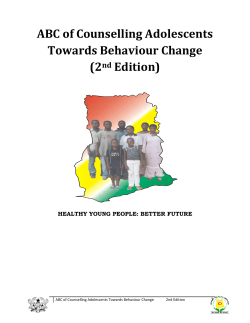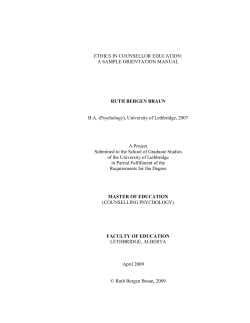
P ractical Techniques in Counselling Children (Character Building Approach)
P ractical Techniques in Counselling Children (Character Building Approach) Unit Overview Welcome to Practical Techniques in Counselling Children (Character Building Approach). This unit is designed to cater to counselling students, social workers, teachers, counsellors and volunteers who would like to equip themselves with specific skills to work with children. It is also applicable to anyone who wishes to work with children or understand children from a perspective of character building in children. This unit will provide an introduction and basic training in the nature and processes of counselling children. Counselling children skills including micro skills on which counselling activities are based on such as observation, active listening, getting the children to tell his / her story, and dealing with resistance and transference etc will be introduced. This unit will also introduce a character building approach in counseling children which is basically not a new concept as counselling children is basically about helping the child develop good character for more constant and stable therapeutic behavioral change. Therefore, this unit will highlight the importance and put emphasis on how character education and development can be incorporated into counselling children. Learning objectives: Upon completion of the course, participants will be able to: v Develop an enhance understanding of the learning and practise of counselling children skills in a possible systematic and sequential way. v Develop skills in planning strategically for an effective children counselling session and applying it. v Develop a prompting in participants to consider their own counselling skills, process and tools and understanding how these may affect the success of counselling a child. v Develop awareness in character education and development and how it can help in the counselling children process. 1 Learning / Teaching Methodologies and relationship to objectives. v Lectures and small group discussion / tasks focusing on development of insights and understanding of children counselling needs, skills and processes. v Encouraged peer review and feedback on skills to promote and highlight the importance of counselling children micro skills and process refinement. v Videos / practical demonstrations will be shown to indicate the counselling skills and processes used. v Key text and additional notes will be given to minimise reliance on library materials. Practical Techniques in Counselling Children (character Building Approach) 1) INTRODUCTION Taking a look into a child’s world A) What causes problems in our children? v v v v v Change in family structure Shifting of values Societal crises Lack of character building Summary – Family / Friends / Choices B) A child’s cognitive and personal world v v v v 4 stages of cognitive development in children Children’s social development Maslow Hierarchy of needs in children Children play and learn C) A child’s world of resilience The world of counselling children A) What is counselling and how does it differs from psychotherapy? B) Attributes of a children counsellor v v v v Sincere and congruent Time to play and time to be serious – understands what triggers a child. Non-judgemental and accepting Emotionally detached with empathy C) The counsellor – child relationship v v v v v Child’s world is understood and appreciated is exclusive and able to bond with each others. is safe and warm is authentic and fun is respectful of confidentiality (subject to limits) v is non-intrusive and non-threatening v is intentional and purposeful v Non-physical Goals for counselling children A) Basic goal B) Parents’ / caregivers’ / guardians’ goal C) Counsellor’s goal D) The child’s goal 2 Practical Techniques in Counselling Children (character Building Approach) 2) PRACTICAL FRAMEWORK Which approaches to counselling children are effective? - Historical background of counselling children. The counselling process A) Initial expectation from / with parents and guardians. v v v Initial assessment phrase Receiving information referral / direct Expectations both ways B) Children’s resistance to counselling session / Overcoming it as counsellor v v Why do children resist counselling session? Techniques in overcoming resistance C) Discussion of child therapy flow chart v Systematic approach D) CCM (Counsellor / Coach / Mentor) approach in counselling children v v v v v Focusing on the goals Counsellor and child gender issues Influencing the child Showing the child the signboard of character traits Gaining respect from child E) Therapeutic changes in a child during the counselling therapy process v v v v v v v v v v v Emotionally disturbed Joins with counsellor Revealing information Intensification of emotions Deflection from pain to withdrawer Resistance – “Is it safe to talk more?” Continuation of information Making internal choices to feel positive Guided rehearsal of positive new changes Emotion resolution and adapting new changes with character development Sequential therapeutic changes is not realistic F) Counselling children through family therapy v v v What is a family? Child’s functioning within a family Individual counselling with family therapy G) Keeping counselling records v Orderliness is vital 3 Practical Techniques in Counselling Children (character Building Approach) PRACTICAL FRAMEWORK Skills in counselling children A) Introduction to skills in counselling children in local context B) Counselling environment and misc v The counselling place v Counsellor’s appearance v Visual attraction / disturbance v How self destructive beliefs affects a child v Challenging self-concept and self destructive beliefs as a counsellor C) Connection v How to create the sparks between counsellor and child? v Tricks up the sleeves I) Addressing unhelpful thoughts and behaviours v Actively facilitating change techniques v Addressing unhelpful thoughts and behaviours v Comic strips exercise v Monsters in me exercise v Stop-Think-Go traffic light exercise v Mirror me exercise D) Subtle and keen observation v General observation v Behaviour / Motor skills / Play skills v Intellectual / thinking / Speech and language processes v Child’s relationship with counsellor J) Termination of counselling process v Is termination final? v Forewarning v Observation of termination signs v Long term / short term review v Aftermath feelings of counsellor E) Active listening v Body language v Creative use of minimal responses v Reflection of content / feelings / content and feelings v Summarizing v Is the child telling the truth? Counselling children in a group F) Leading and guiding the child in revealing inner feelings v Heighten use of observation and active listening v Asking questions – open and closed questions / to raise awareness v Use of statements to raise awareness of important issues v Use of media G) Dealing with Resistance v Why resistance occurs? v Types of defence behaviours H) Dealing with Self concept and Self-destructive beliefs v How self concept affects a child 4 v v v v Plan / unplanned sessions Numbers of facilitators Facilitation objectives Closure of matters / dealing with unresolved feelings after. Counselling children with special concerns v v v v v v Physical abuse and neglect Sexual abuse Chemically dependent families Death and bereavement Depression and suicide Dysfunctional family structure Counselling children with special needs v v v v v v Behavioural-emotional disorder Learning disability ADHD / ADD Mental retardation Physical disability Counselling these children’s parents. Practical Techniques in Counselling Children (character Building Approach) 3) THEORETICAL FRAMEWORK OF PLAY THERAPHY Therapeutic powers of play and the beneficial outcome of play therapy The ideal play therapy room Selection of appropriate approach to play therapy Cross-cultural applications Types of plays: v v v v v v v v v Miniature animals Sand-tray work Working with clay Drawing, painting, construction and collage The imaginary journey Books and stories Puppet and soft toys Imaginative pretend play Impromptu initiatives 4) COUNSELLOR’S LEGAL AND ETHICAL CONSIDERATIONS Legal and ethical considerations decision-making models Counselling minor Confidentiality issues / governing laws Competence Child abuse reporting Informed consent Duty to protect 5) PRACTICUM 5 Practical Techniques in Counselling Children (character Building Approach) TRAINER PROFILE Raymond Cheong, (Dr) D.MIN, CMACA (Clinical), IAMFC Founder / Chief Executive Certified Clinical Counselling Psychology Practitioner Professional Children and Family Counsellor Master Counselling and Character Education Trainer Dr Raymond Cheong is the Founder and Chief Executive of Professional Counselling & Character Development Resources (International) with the aim of creating resources and trainings for parents, children & youth educators in Singapore and also around Asia. He has travelled extensively to countries like China, Indonesia, Vietnam, to promote counselling and character development and education in children and youths. Together with Dr Klein Tan, they have both pioneered the concept of character therapy, a philosophical approach to counselling. He also founded the now voluntarily dissolved We-sharecare Society For Children & Youths (Singapore) which operated for almost 10 years. During those times, Raymond was involved in children & youth clinical counselling works and has done clinical counselling for many children over the years. In Singapore, he has conducted talks and training seminars to schools and to teachers and parents on the subject of Social and Emotional Learning with character development. He has written a “CHOICES” Character Guidebook that is used in some schools in Singapore. The book is also translated to Chinese and Bahasa Indonesian to be sold in China and Indonesia. He is also the Character Education and School Counselling Consultant to China-Singapore SIP International Education Services Co. Ltd (CSIES) and helped started the first character Kindergarten in China, Suzhou where he revolutionized and helped to write pre-school curriculum teaching materials by infusing character education and development elements in it. He has trained teachers, parents and lay counsellors on the subject of Counselling and Character Development in many parts of China and Indonesia. He is a Professional member of the American Counselling Association in International Association of Marriage and Family counsellors and a certified clinical counselling practitioner with the Australian Counselling Association. He is also an Associate member of the Singapore Association for Counselling. 6 Practical Techniques in Counselling Children (character Building Approach)
© Copyright 2025

















